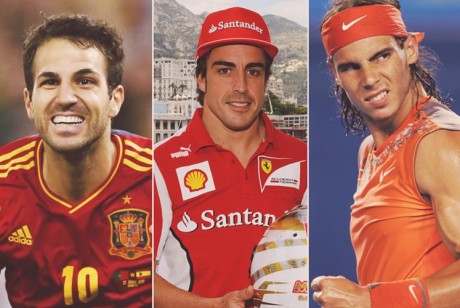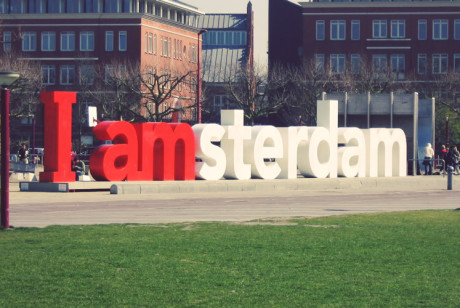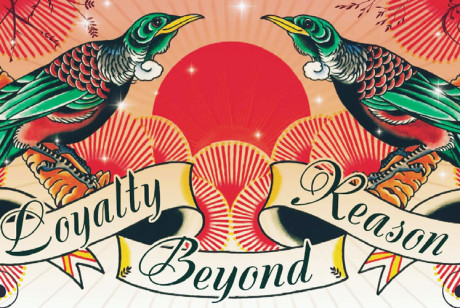New Rules
Friday, 26 March 1999 - Edinburgh, Scotland

Presentation Summary
A keynote address to the Institute of Chartered Accountants of Scotland Annual Conference. The key to wealth creation today lies with the intangible – ideas and relationships rule supreme. Accountants have negotiated the transition to the Age of Ideas better than many other industries, but the challenges of change continue.
It’s great to be here today because I was invited to speak about three of my great passions – Peak Performance, Ideas and Sport.
It’s also appropriate that I should be here this week because Monday was a public holiday in Dunedin, New Zealand, the Edinburgh of the south. It was the anniversary of foundation of the city by colonists from Edinburgh last century. The streets of Dunedin still bear the same names as Edinburgh’s.
In my capacity as a board member of the New Zealand Rugby Union I would like to thank your Edinburgh forbears for the gene pool which produced such great Dunedin All Blacks as Duncan Robertson, David Kirk, Chris Laidlaw, Earle Kirton, Laurie Mains, Josh Kronfeld and Jeff Wilson.
As accountants I’m sure you will appreciate the services to Scottish rugby of Sean Lineen, Martin and John Leslie as a rather belated but very high quality return on your investment.
But I’m not here to talk rugby, although I will give you the latest from New Zealand after the speech if you’re interested. Today I want to share some exciting new ideas I’ve been working on with a team in New Zealand about how organisations can become the Peak Performers of their field. First, though, I want to talk about ideas.
I’m from New Zealand and I believe in ideas. You are Scottish accountants, so I know you understand where I’m coming from.
New Zealand is a lot like Scotland. It’s a small nation of highly innovative ideas people. New Zealanders are proud of the eclectic list of great ideas we have contributed to the world – from votes for women and the state social welfare system to the splitting of the atom and bungy jumping for the masses.
Scotland is the only nation that has out-performed us in world changing ideas per head of population. The list of Scottish inventions is astounding, as you all know better than I do. The steam engine, the television, telephone, telegraph, pneumatic tyres, vacuum cleaners, thermos flasks, cloned sheep, and cloned food – I presume McDonalds is Scottish?
Why do two such small nations produce such big ideas? I’ve got a theory. It’s all about our places on the fringe, at the edges – New Zealand on the edge of the world, way down under, and here in Scotland on the edge of Europe.
The power of the edge is one of today’s most compelling intellectual devices. It’s based on the biological metaphor, which is set to make the biggest changes to the way humans think about the world since we lost God.
This metaphor says that our modern networked economy, and our culture, operates like a biological organism – guided by the same processes and influences that determine change in nature. Changes in species almost always occur first at the fringe of a species’ range, where the population is most sparse and where the orthodox ways of the centre are weakest.
Innovation anywhere is all about being on the edge of the mainstream, where the assumptions and entrenched ways of the centre are weakest. World changing ideas are most likely to appear in a place and emerge from a business that is free from conformity and the stifling effect of convention.
Scots and Kiwis are natural ideas people. This period of history is made for us.
Today ideas are everything. This is the Age of the Idea. The information age is over. Information is no longer a premium product. It has become a commodity. There’s so much information available today that it means nothing by itself. The world does not need any more information. We need ideas. Ideas make sense of information. Ideas have become the supreme premium products of our time.
Just look at how our society has become obsessed by the new, the unusual, the innovative, the improved. Change is our addiction. Unique has become our Holy Grail.
There’s sound business sense for that. How many times have we seen over the past ten years that first-to-market means market dominance? In a global intensely networked economy, the mantra is market share. Create a market and you have a better than even chance of building lasting market dominance. Just ask Intel, Microsoft, WalMart or CNN. The imperative to be first to the future has never been more compelling.
In my industry ideas are the key to communication with consumers. Consumers are suffering information overload. Ideas are the tool that cuts through the info-clutter and global media noise for attention. Ideas make meaningful connections with the hearts and guts of consumers.
Ideas empower. Contrary to your grey and boring image, accountants have been empowering people with ideas forever.
Accountancy shapes information around ideas that turn meaningless screeds of numbers into powerful tools – dynamic and constantly evolving ideas like shareholder value and free cashflow that become tools to drive big changes in the way business is done.
The age of ideas is a product of a new economic order. The new order has new rules. Every company in every industry must respond. Primary among the new rules is the power shift from the muscle to the mind. Once we talked about capital in terms of financial assets and the physical means of production. Now we realise that intangible things like ideas and relationships rule supreme. Ideas are the premium product; inspiration and creativity the means of production.
This new economy is intensely interlinked. It is a global network economy where making connections between people and ideas is the key to wealth creation. Changes in San Francisco affect Edinburgh as quickly as they do New York or Auckland. The pace of change and the value of big ideas increases with the size of the network.
This is all great news for you and for me. Accountancy is an ideas business, believe it or not. So is communication. But just starting in the right territory is no guarantee of success or even survival. All industries are changing at a phenomenal pace. Accountants and agencies must both respond to the new environment with a new kind of organisation.
Accountants’ response to the new economy has been among the best of the groups that underpinned the old industrial age. The evolution of accountants into Management Consultants has been a natural shift which has preserved the influence of the numbers people in the boardroom. The jury is still out on the effect that shift has had on boardroom creativity.
Even the most basic rules of accounting and corporate finance no longer look so certain. New companies are changing the rules with revolutionary new business models underpinned by ideas like negative working capital and negative asset intensity. The global stock market stars have become negative to nil profit concept stocks with P-E numbers that rocket through the roof.
Never has the threat to the established companies in every area been greater. Never has the corporation’s need for inspirational leadership been more compelling. Never have accountants needed to emphasise creativity and the ideas side of your profession more.
Until now, advertising agencies have not feared as well as accountants. Advertising agencies have allowed our role with clients at the strategic end of marketing and brand building to be eroded. Agencies have stood dumb as the desperate need for inspiration to be added to the brand mix has been systematically neglected. Often by consultants.
My mission at Saatchi & Saatchi is to halt the decline.
Brands are the most important asset any company has got. We are reasserting the natural role of the advertising agency as the source of the strategic inspiration that drives the brands of our great clients like Procter & Gamble, Toyota, General Mills, Visa and Hewlett Packard.
Our mission is based on two strong pillars. The first is our zealous belief that creativity, inspiration and out-of-the-box thinking are vital elements of the business mix that have been underemphasised. Brands are energised by these three things and nothing else. Advertising agencies are the natural place for any brand-based business to look for them.
The second pillar is a new model for our company.
We believe that success, if not survival, in the new economic order demands a new kind of company. A restless company that accepts the mantra “first to the future” unreservedly. A company which understands that today we are playing a new game.
Every company in the ideas business must seek to smash the hierarchy of thinking that tells us what we should and shouldn’t do. That’s why Saatchi & Saatchi took the word advertising out of our name. We want to create an organisation for thinking differently. An organisation dedicated to communication through ideas bigger than advertising.
We need new models to guide us. Old paradigms and benchmarks must be abandoned. Old objectives – like excellence – must be abandoned. These days excellence is no longer enough. Perfection has become a commodity. It’s just the table stakes to get you into the game.
The great companies today must lift themselves beyond their competition onto a completely new level. Companies must perform to their potential every day. Companies must lift themselves beyond high performance to Peak Performance.
Peak Performance is an obsession of mine. I’ve been consumed by achieving it ever since my days as a rugby player. I have always sought the X-factor that can lift my team into the Peak Performance zone.
Sport has been the source of some of my most inspiring experiences of Peak Performance. I’ve experienced it as a player, as a fan, and as a member of the All Blacks Board. I have always sought to recreate that experience in business.
I share my love of sport and passion for performance with a team of colleagues at the University of Waikato in New Zealand where I teach graduate students in the School of Strategic Management and Leadership. Our research team has been developing an organisational model for businesses based on the Peak Performers of the sports world.
We’ve broken with the convention. The accepted wisdom in Management Science is to look at successful companies for answers to questions about business performance.
We say that sport is the richest arena for evidence of sustained peak performance. In sport you constantly find sustained records of excellence and achievement. Inspiring stories of grit, guts and genius.
Sport is the great social phenomena of the 1990s. The fastest growing thing that involves the biggest deals and the most youth. Sport connects hearts and minds in a way that is pure rock n’ roll. It is empowering and enfranchising more young women and men than any other movement in history.
The sports we selected for our study were team based and global, with a critical mass of competitors and high participation rates in the general population.
Each team we examined had exhibited continuous championship contention for at least a decade. They may not have been the champions every season, but they were always serious contenders.
The sporting organisations we spoke to are businesses, in many cases large and successful businesses with the competitive spirit razor edged. They are all competing in the fast changing entertainment industry where competition for the disposable dollar is fierce.
So who did we visit? The most winning baseball team of the 90s, the Atlanta Braves. In basketball there was only one choice – the Chicago Bulls. In Formula One racing it was natural to chose the exceptional performer of the past ten years, the Williams team. In football we went to the legendary Bayern Munich and the German national team. In gridiron we visited the San Francisco 49ers. Australia has the world’s best cricket team, the best netball team and the best women’s hockey team. The New Zealand All Blacks are a team with an 80 per cent win rate over the past 100 years, and also from New Zealand come the winners of the America’s Cup in yachting, the crushing victors of the 1996 regatta.
We have been seriously inspired by our experiences. These haven’t been dry field trips, but a journey into the hearts, minds and guts of some of the world’s most finely tuned, inspired and acclaimed individual performers, teams, athletes, coaches and leaders.
We immersed ourselves in ocean spray and screaming engines and packed stadiums. We listened and we observed. We talked to the players, chief executives, directors, team managers, coaches and fans. We went into the locker rooms, the dugout and the pit lane garage. We spent time in the offices which house each team’s supporting organisation. We watched, and we interviewed all the heroes – from the ticket sellers through to Franz Beckenbauer, Frank Williams, Karl-Heinz Rummenigge, Jacques Villeneuve, Michael Jordan and Jonah Lomu.
The result is a model called the Peak Performing Organisation, or PPO. A PPO is high performance, strategically-driven and able to sustain outstanding long term performance to the maximum of its potential.
We have isolated The Peak Practices of Peak Performing Organisations. A set of organising principles for sustained Peak Performance and continuous contention. Each principle plays to and draws from the others. The absence of any one can severely damage the ability of an organisation to achieve and sustain Peak Performance.
The first practice is called Making Magic.
We heard the word “magic” used over and over to describe consistent success. On the surface it seems unexplainable. Last second goals, freakish plays, the overwhelming victories, the no hitters and the hat tricks.
Magic is mysterious. It’s intangible, it’s seductive and it’s powerful. And it produces real, in-your-face, results.
Magic is moments which become legends. Like when every living room, street corner and bar in Chicago and points throughout the world erupted in euphoria, when Michael Jordan shot the basket in the last second to win the Chicago Bulls their sixth NBA title in seven years.
Magic is the essence winning. It’s vital to a Peak Performing Organisation.
Making Magic is an inspirational aura that pervades an organisation. It is a clear, unrelenting vision that this organisation is the best because extraordinary things happen here.
It is a feeling of expectation that something extraordinary is just about to happen.
Magic is essential to maintaining the dream of greatness. Believing in magic keeps people believing that nothing is impossible. It keeps them passionate.
Frank Williams, of Williams Formula One, said it like this: “There are some very clever people working here, but the biggest advantage we have is magic. Most people here are nuts about what they do.”
In sport Magic is a principle characteristic of fandom. In business it’s the basis of permanently infatuated clients.
The second principle is that Peak Performing Organisations need Inspirational Players.
Amazing players like Michael Jordan, described by some as the greatest athlete of the century.
Players like Frank Williams, the wheel-chair bound genius whose disability strikes fear into the hearts of other Formula One Constructors because, one of them notes, “he has more time to think”.
Each of the PPOs have inspirational players on and off the field. These are the stars and mentors. The gamebreakers. They provide leadership, coaching and depth. They make moments of magic. Inspirational players are demanding, infectious, accessible and energetic. They inspire others with the confidence to exceed their personal best.
Through their presence they do more than win games – they become the legends that go on to inspire the belief of the organisation in its own greatness. This belief is an essential ingredient of sustainability.
If you are a leader in your company, then you should regard inspiration as your number one function. This is an age for leaders not managers. Inspiration is what separates leaders from managers.
The third principle of a PPO is Creating the Future.
PPOs have a deep commitment to developing team members from the very young onwards, and making sure they keep their key personnel for years and even decades. These key players act as coaches and mentors for the less experienced. They ensure that the culture of the organisation is transmitted to each new member.
PPOs have built deep processes for scouting, selecting, attracting and progressing players. Players are bought in selectively to feed the dream. There is an unrelenting commitment to mentoring and development.
Creating the Future takes patience. Michael Jordan joined the Chicago Bulls in 1984, but they didn’t win a championship until 1990.
Principle four of a PPO is Community, an intense sense of belonging among all of the organisation’s members.
It’s hard to overstate the positive, motivating effect this sense of community had on the members of every organisation we visited.
Community is at the base of genuine team play where sacrificial plays on and off the ball, on and off the field are the accepted norm.
The Community spirit creates a calm and relaxed work environment. The kind of environment that allows the mental clarity you need for peak performance.
The fifth principle is Exceeding Personal Best – a deep commitment by each individual to personal stretch. Exceeding personal best is the daily performance measure of the athlete. It’s their consuming obsession.
As Jonah Lomu put it “What we hate most is coming second best to ourselves”.
When we offered that thought to Michael Jordan he wasn’t perturbed. The greatest player in basketball history’s response was “I don’t mind being second best to myself. Because then I’d be number one and two”.
We found everywhere a committed work ethic. Team members in every part of the organisations hold themselves supremely accountable and responsible for the impact their job has on the final performance.
We saw a deep commitment to education and technical skills. But an equally important part of exceeding personal best is creativity, doing things differently, risk-taking, flair and intuition.
This connects directly to the sixth principle – Game Breaking Ideas.
Ideas are the key to a PPOs competitive advantage. PPOs enable all their people to continually push for and contribute new ideas.
Ideas are the key to a PPOs competitive advantage. PPOs enable all their people to continually push for and contribute new ideas.
Most Game Breaking Ideas are small innovations, such as the way a sail on an America’s Cup boat is stitched together, or how the suspension is tweaked on a racing car to get point one percent of an improvement. In top level sport the distance between winning and losing is measured in centimetres and hundredths of seconds.
A true ideas culture can only flourish where the fear of failure has been removed and risk taking is expected. PPOs embrace experimentation. They pursue failure – small failures – and they learn from them.
If you are pushing the boundaries, there will inevitably be stumbles. As Williams Technical Director, Patrick Head, the man they call the God of Formula One engines, put it – “The focus is on how you’re trying to put it right, not on blame for why it’s not right”.
Principle number seven is Game Focus. In a PPO, players focus on simple goals. The goals are well understood by everyone, challenging but achievable. They concentrate energy and attention, and provide immediate direction and feedback. Smaller goals contribute to larger ones. The next play, the next game, the next season, the next ten years.
Maintaining Game Focus is totally dependent on a team’s ability to continually re-focus their game. Nothing stays the same for long. To keep winning, teams must constantly change their goals.
In the All Blacks we’ve had a less than brilliant last season. We’ve learnt from our failures and we have stayed focussed on our ultimate goal – to win the World Cup in Wales. But we have also had to redefine our path to the cup with some new goals. Focus is vital to maintaining direction.
The opposite of focus is entropy: the state of mind where consciousness is a confusion of anxieties, problems and uncontrolled thoughts.
Maintaining game focus can mean changing the game you play. At Saatchi & Saatchi we’ve realised that the game played by a traditional advertising agency is restrictive. We’ll drop out of contention if we keep playing to the same tired old formula. We need a new game with new rules for a new era. Our new game is ideas, and our new goal is to become the hottest ideas company on the planet.
Principle eight describes the extraordinary ability PPOs have for Sharing The Dream.
PPOs are all inspired by a dream of greatness, and they are extremely skilful at sharing that dream with people outside their organisation – the fans, the sponsors, the public.
They do this in a hundred ways. The physical arena, the pre-match rituals, the choreography and the orchestration. The broadcast rights, the profiling of their stars, the fan clubs, books, merchandising and all the other paraphernalia of association.
They use big devices like the gigantic image at Turner Field of the ball that Atlanta Braves legend Hank Aaron smashed out of the ball park to clock up 715 career home runs and beat Babe Ruth’s tally.
Whenever people come into contact with a PPO something special emerges. It could be fierce loyalty or simply enchantment with the contact.
Sharing the dream opens new business opportunities, more participants and more partners – and it helps to energize and sustain the dream within the organisation.
The ninth principle is The Last Detail. The commitment to getting every last detail right.
The commitment comes from team members’ sense of individual responsibility, not from discipline and control exerted from the outside. It includes small superstitions and player rituals. The way an athlete ties his boots. The order a mechanic lays out his spanners on race day, every race.
There is no rule book for The Last Detail. It is the last straw that broke bureaucracy’s back.
PPO people understand that every detail of every organisational process, no matter how small, is vital since it could make the difference between winning and losing. The Last Detail is all about obsessive perfectionists.
Williams Formula One is obsessed with the last detail. Each car is completely pulled apart between races and subjected to over 200 diagnostic tests and then rebuilt. The workshop is meticulously clean, it looks more like an operating theatre than a garage.
Commitment to the Last Detail means PPO members value each and every job in the organisation, no matter how small.
It means nobody questions the necessity of polishing the hull of a yacht or the nose cone of a racing car a thousand times to make it one thousandth of a second faster on every lap, because that may be the difference between winning and losing.
I believe that every organisation can use the Principles of Peak Performance. Every organisation should aspire to greatness like the teams we studied. Every organisation can take inspiration from these stories.
We’ll be telling our story in full towards the end of this year when our book on Peak Performing Organisations is published.
If there is one over-riding learning which we have taken from our study, it is that a Peak Performing Organisation releases the awesome and wonderful potential of the collective energy of its members. Peak Performing Organisations are winners because they are first to the future.
Thank you very much for your time, it has been a privilege to present to you our team’s thinking.









